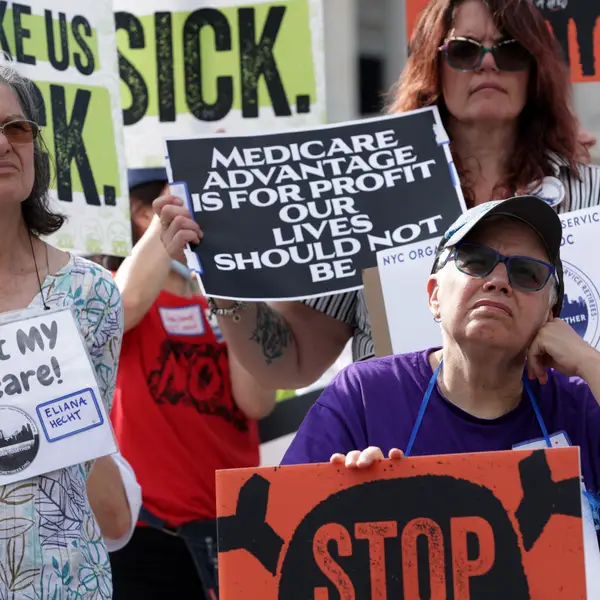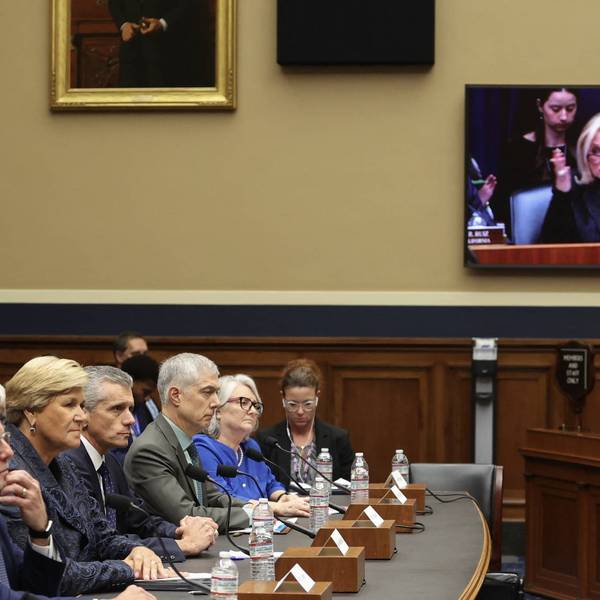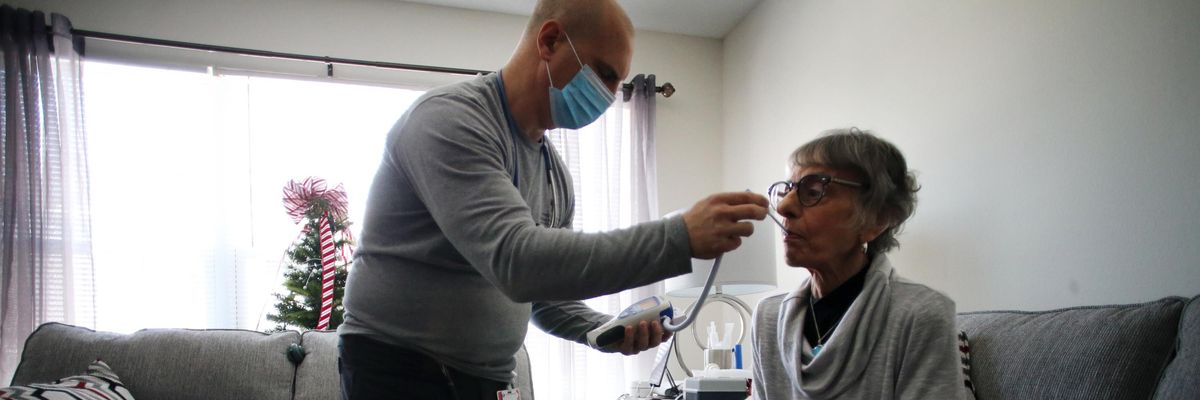The private equity industry's business model of buying up companies and extracting as much profit as possible over a short period of time has made it a notorious force in the United States, where it has gained a solid foothold in a range of sectors--often with disastrous consequences.
In recent years, according to a new report, private equity firms have increasingly sunk their teeth into the fast-growing home healthcare and hospice industries, alarming advocates and researchers who say private equity's pursuit of maximal returns over all else is hurting vulnerable patients and workers.
"For-profit home healthcare and hospice companies have been linked to lower standards of care compared to their non-profit counterparts."
"Due to increased demand and stable Medicare and Medicaid reimbursement schemes, home healthcare and hospice services--industries that had traditionally been dominated by non-profit companies--have increasingly been provided by for-profit companies," reads an analysis published this week by the Private Equity Stakeholder Project (PESP).
"As for-profit home healthcare and hospice companies have become more profitable, private equity firms have turned to them as reliable sources of revenue in the healthcare sector," the report notes. "Unfortunately, for-profit home healthcare and hospice companies have been linked to lower standards of care compared to their non-profit counterparts, including, but not limited to, a lower number of visits to patients by healthcare professionals (registered nurses, physicians, or nurse practitioners) in their final days in hospice, higher rates of hospitalization in home healthcare, and poorly paid--yet highly stressed--employees in both sectors."
"This is additionally troubling, the report adds, "because such for-profit entities serve higher percentages of people of color and those with low incomes."
Throughout the coronavirus pandemic, the private equity industry's expanding investments in nursing homes--the epicenters of many early Covid-19 outbreaks--has come under growing scrutiny from lawmakers and researchers, spawning studies linking private equity ownership to worse care and higher mortality.
"How many grandmothers and grandfathers died because profits were prized above lives, with our taxpayer dollars funding this?" Rep. Bill Pascrell (D-N.J.) asked last year during a hearing on private equity investment in nursing homes.
Analysts have suggested that a growing mistrust of nursing homes, particularly as the coronavirus pandemic continues, could accelerate a shift toward home-based healthcare--and private equity appears to sense an opportunity to further expand its reach.
"It's an even less regulated space than nursing homes," Chris Noble, PESP's policy coordinator and the author of the new report, told Common Dreams in an interview.
"As folks in this country especially are utilizing home health and at-home hospice a lot more... this is something we should at least take as serious," added Noble, who is calling on lawmakers to pay more attention to private equity's incursion into the home healthcare and hospice sectors.
From 2018 to 2019, according to Noble's analysis, "private equity was involved in almost 50% of deals in the home healthcare industry."
The two arenas are highly attractive to private equity in part because they're awash in a steady stream of federal money that's often ripe for the taking. For hospice payments, Noble points out, "Medicare accounts for about 85.4%, Medicaid for 5%, managed care or private insurance for 6.9%, and other (including charity and self-pay) for 2.7%."
To illustrate some of the dangers posed by private equity's growing role in home-based and hospice care, Noble spotlights several private equity-owned home healthcare and hospice companies that have recently been embroiled in controversy, including over unlawful underpayment of workers and fatal lapses in patient care.
In the case of BrightSpring Health Services, a home healthcare company owned by the private equity firm Kohlberg Kravis, "a client hit her head twice before dying in 2016--once when her wheelchair wasn't properly secured in a company van and another time days later when she fell getting out of bed due to lacking rails, which she required given damage sustained from a stroke."
"Policymakers should be vigilant as to the effects that such consolidation may have on patient care and employee wellbeing."
Private equity-owned home healthcare and hospice companies have also faced legal action from the federal government and states for over-billing Medicare and Medicaid. Apria, a home healthcare equipment company majority-owned by the private equity behemoth Blackstone, "submitted false claims to state Medicaid programs for noninvasive ventilators that patients didn't use or were not medically necessary," according to PESP's report, which cited the office of the Florida attorney general.
Apria has also engaged in a practice known as "dividend recapitalization," a tactic commonly used by private equity-owned companies to enrich investors at the expense of the underlying business.
As the Washington Post reported last year, Apria "paid its owners and executives $460 million in dividends... by taking on $410 million in new debt."
Noble warned that as private equity's takeover of the home healthcare and hospice industries gains speed, "profit incentives continue to jeopardize quality of care for patients and quality of life for employees."
To mitigate the harms of what he termed private equity's "model of profit extraction," Noble urged Congress to strengthen transparency laws to require changes in ownership and control of home healthcare and hospice companies to be reported to the federal government.
Such a step, Noble argued, would allow the public to "know what entities are ultimately accountable for the care of their loved ones."
Noble also recommends prohibiting or limiting dividend recapitalization and strengthening regulatory oversight in the home-care industry by requiring a "higher frequency of inspection for a period after a period after a change in ownership."
"As the home healthcare and hospice industries continue to be consolidated by private companies, policymakers should be vigilant as to the effects that such consolidation may have on patient care and employee wellbeing," Noble wrote.
"Transparency and accountability for privately-owned home healthcare and hospice companies," he added, "is key to ensuring that quality of care, competition, and fair labor standards remain intact, and that public money goes towards improvements in the industry rather than simply lining the pockets of private equity shareholders."
In the U.S. Senate last year, Elizabeth Warren (D-Mass.) held hearings and reintroduced new legislation titled the Stop Wall Street Looting Act to combat private equity's "predatory" and "abusive" practices, but that bill remains stalled in the closely divided Congress.




